Today, I’m celebrating the e-book launch on 1st February of The Girl Who Liked Giraffes which was originally published under the title A Desperate Remedy. I thought of naming this blog A Tale of Two Titles. I had wanted to call it The Girl Who Liked Giraffes; I ran it past my Creative Writing students at the College of Further Education where I taught; they loved the title. I then ran it past my G.C.S.E English Language and my ‘A’ level English students – and they, too, liked it. But my publisher, Robert Hale, didn’t. Mr Hale want Heiress at Risk. I found myself thinking crossly that Heiress at Risk was a one size fits all sort of title – it could apply to a number of my books – Frost Fair, say. Eventually, I pinched Thomas Hardy’s title Desperate Remedies, and offered Mr Hale A Desperate Remedy (fortunately there’s no copyright on titles) and he accepted it.
Cover for my e-book The Girl Who Liked Giraffes. The four giraffes arrived in London in 1836
So when I started on my e-books project, one of my first thoughts was: at least I can now re-name A Desperate Remedy.
I also remembered that, due to circumstances out of my control, I’d had to write the book at top speed and there were bits of it I wasn’t happy with. In spite of that, A Desperate Remedy did well. It went into Large Print, both in the U.K. and in the U.S.A; and it was also published in Soundings Audio books, read by a proper actor, Gordon Griffin. There’s an art to reading out loud; Audio books needs emotional colour; characterization needs to be brought out, exciting bits needs to be read differently from reflective passages, and so on. The reader doesn’t just need an attractive voice, he or she needs to be able to act, as well. And Gordon read it beautifully.
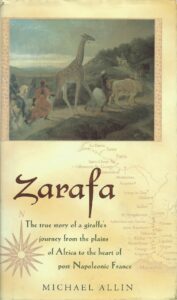
Zarafa by Michael Allin. The story of the giraffe given to Napoleon by the Pasha of Egypt – and the book which inspired ‘The Girl who Liked Giraffes’
The book was also sold to Da Capo, a Polish publishing house who had published four of my previous novels. Sadly, Da Capo went bust before the book could come out. Still, I comforted myself with the thoughts that at least they’d paid me first!
My now properly named The Girl Who Liked Giraffes needed some work doing to it, especially in the early chapters. I was aware that the register was wrong. My heroine, Decima, is only twelve when the book opens and, looking at it now, in 2021, I realized that she spoke and thought in far too adult a way. Would a naïve young Decima really think: she had suspected some financial impropriety? The language was far too adult, and it jarred.
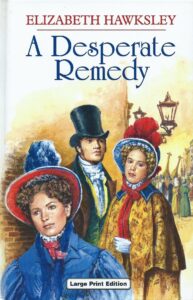
The large print cover of ‘A Desperate Remedy‘. You can just see the giraffes walking to the new London Zoological Gardens in the background.
When she realizes that her father has probably cast her off forever with only a few shillings to her name, would she really say, ‘I … I shall have to get used to the change in my circumstances.’ I doubted it. OK, she’s now twenty but the register was too distant, too emotionally uninvolved. Or, putting it bluntly, too boring.
Yes, Decima is a thinking girl but she needs to think in a way appropriate to her age and education – a typical female education, where History was taught by learning Magnell’s Questions off by heart, and an hour on the back board was seen as more important than learning about the world around her. Mr Wells, Decima’s father and a self-made man, believed that ladies shouldn’t meddle in men’s affairs; and that it was unfeminine to read a newspaper, say (which is where Decima learns about the four giraffes given to King George IV by the Pasha of Egypt.).
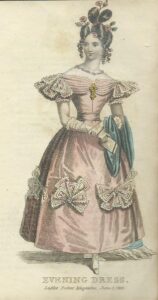
Pink Evening Dress, 1831. This style would not suit a tall young lady with a generous figure – it would make her look like a giantess.
Decima does not conform to what her father and nine brothers think a lady should be: that is, meek at all times and with no opinions of her own (which, as she’s female, would be worthless, anyway). She is a tall girl, and her figure is too generous for the fashionable, ethereal look. Furthermore her hair is too thick and her cheeks too pink. Worst of all, the over-elaborate dresses that she is forced to wear make her look like an over-iced cake.
But I have just the person to help her: Wilmot, Alexander’s valet, is a wizard on fashion, colour, and what suits different female figures…
Basically, the early chapters needed livening up – which is what I set about doing.
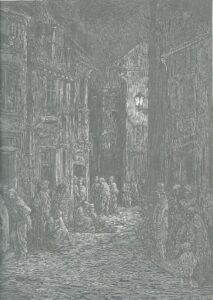
In the St Giles’s Rookery by Gustave Dore. Houses once lived in by the rich, have now come down in the world and become a notorious slum
I also like to add a dollop of risk, danger and menace to my books: heroes and heroines need their mettles testing. In The Girl Who Liked Giraffes, I invented a dangerous gang from the notorious St Giles Rookery just behind Covent Garden, heavily involved in theft, particularly of portable gold and silver items which can be re-christened, that is, any give-away coats of arms or inscriptions must be got rid of so that the items can be sold. It’s dangerous work – and the gang don’t take prisoners. Sir George Peverell’s country house is known to have a fine collection of Indian gold and silver cutlery and plate. So, which of my characters could be in desperate need of money? Sir George’s second gambling son Hugh, perhaps? I must not forget that something serious needs to be at stake. And how could I link this with Decima?
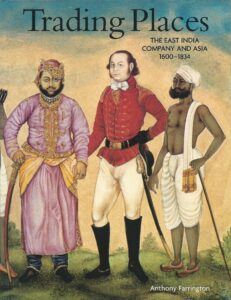
Trading Places: The East India Company and Asia 1600-1834 by Anthony Farrington. The wealthy Indian and the European gentleman are depicted as friends.
The other thing I needed to do some research on was the Indian connection. My hero, Alexander, is half Indian – his father, Sikander, is a proud Pathan warrior; his mother, a vulnerable English lady, is neglected by her husband and desperately lonely. Alexander was born in 1806, at a time when relations between Indians and Englishmen were more equal than they became later. It was not unusual for Englishmen to take Indian wives and to socialize with Indians of a similar rank to themselves. The Girl Who Liked Giraffes is not set in Imperial British India; that only came into being in 1858, a generation or so later.

Wootton House, standing in for Peverell Park, home of Sir George Peverell, Alexander’s father.
Nevertheless, the germs of racial prejudice existed and, once Alexander comes to live in England after his mother’s death when he is fifteen, it becomes something he has to cope with. His father Sikander’s ‘code of honour was everything to him’, and Alexander develops his own code of conduct: ‘I decided long ago that I was who I was. If I live up to my own standards of what an honourable man should be, then the rest of the world can go hang.’
The Girl Who Liked Giraffes is about people struggling to become themselves. And, in a way, this includes me, the author, who has striven, in this new edition, to bring out the story I always wanted to tell.
Elizabeth Hawksley
Amazon: https://www.amazon.co.uk/gp/product/B08VHCFFKD/
Please share this page...
I don’t think I read this one when it first came out, but it sounds a fun read so it is going to go on my tbr list. I wish you lots of luck with it, Elizabeth, but have to confess I prefer the earlier title which I think sounds more in keeping with the period – just from the new title I wouldn’t have known this was a historical novel.
Thank you, Gail. Oh dear – about the title. But how would you know that ‘A Desperate Remedy’ was an Historical novel?! I suppose it’s a bit old-fashioned and maybe it still carries Thomas Hardy echoes.
I read A Desperate Remedy when it came out and it was fascinating reading about how you decided to change it. I look forward to reading ‘The Girl Who Liked Giraffes’ – personally, I loved the new title! Very best of luck! Eleanor
Thank you, Eleanor. There’s something very satisfying about seeing what a difference careful editing can make. It’s a bit like watching a butterfly emerge from a rather bedraggled chrysalis. Of course, I mow have twenty years more experience and that helps, I’m sure.
Congratulations on finishing another e-book!
I shall have to put it on the list. Though books aren’t supposed to be judged by their covers, I think this new cover looks quite a bit better than the original.
I’m glad you approve of my new cover, Huon – I’ll pass the compliment on to John Hocking who designed it – I’m sure he’ll be thrilled.
I do admire the way in which you returned to A Desperate Remedy and examined it, quite without sentiment, so that you were able to make drastic improvements – including the title! I should have said that there was nothing wrong at all with A Desperate Remedy – but how much more tempting is The Girl Who Liked Giraffes – any number of books could be called A Desperate Remedy, but I’m willing to place quite a large bet that there won’t be another book in the world with the new title! Brava, Elizabeth, and I wish you all the luck in the world with your e-book launch!
Thank you, Prem for your kind comment. It’s a strange process, writing a story. One needs to be both objective and subjective at the same time – it’s a bit like walking a tightrope. But, as Sophie says, it’s also very satisfying to have struggled with chapters which you know aren’t working as well as they should, and to have shaken them into a new, more convincing story.
I so look forward to reading this again, now emerged from its chrysalis. It is a very satisfying activity, this return to a somewhat short-changed offspring, isn’t it? At least I found it so, when I edited and republished one of my own favourite titles.
Such a lovely cover and your restored title is delightful, as well as intriguing.
Definitely my evening indulgence for this coming week, which threatens cold and rain and on-going horrible news. I shall sit by the fire and let you transport me to a different time, when challenges were at least more comprehensible than they seem today. And I shall probably mine Wilmot’s expertise for the odd hint or two, as well.
Thank you for your comments, Sophie. It’s always comforting to hear from a fellow author who understands the tortuous process of going back into a book which you know isn’t quite what it should be and removing, moving things about, and carefully adding and tweaking until it settles into a something which you know is better, and you can relax.
Thank you so much for your very nice comments about my recording of your book A Desperate Remedy. I’ve recorded many audiobooks (930 at the last count!) but I remember this book well. Beautifully written with dialogue that was real – an enormous help for narrators! And I like the new title!
Thank you so much for your kind words, Gordon. You’ve made my day! What I really enjoyed about your interpretation of ‘A Desperate Remedy’ (a.k.a. ‘The Girl Who Liked Giraffes’) and, later, of ‘The Belvedere Tower’ was hearing the characters in my books come alive and your narration holding the story together so beautifully. Thank you.